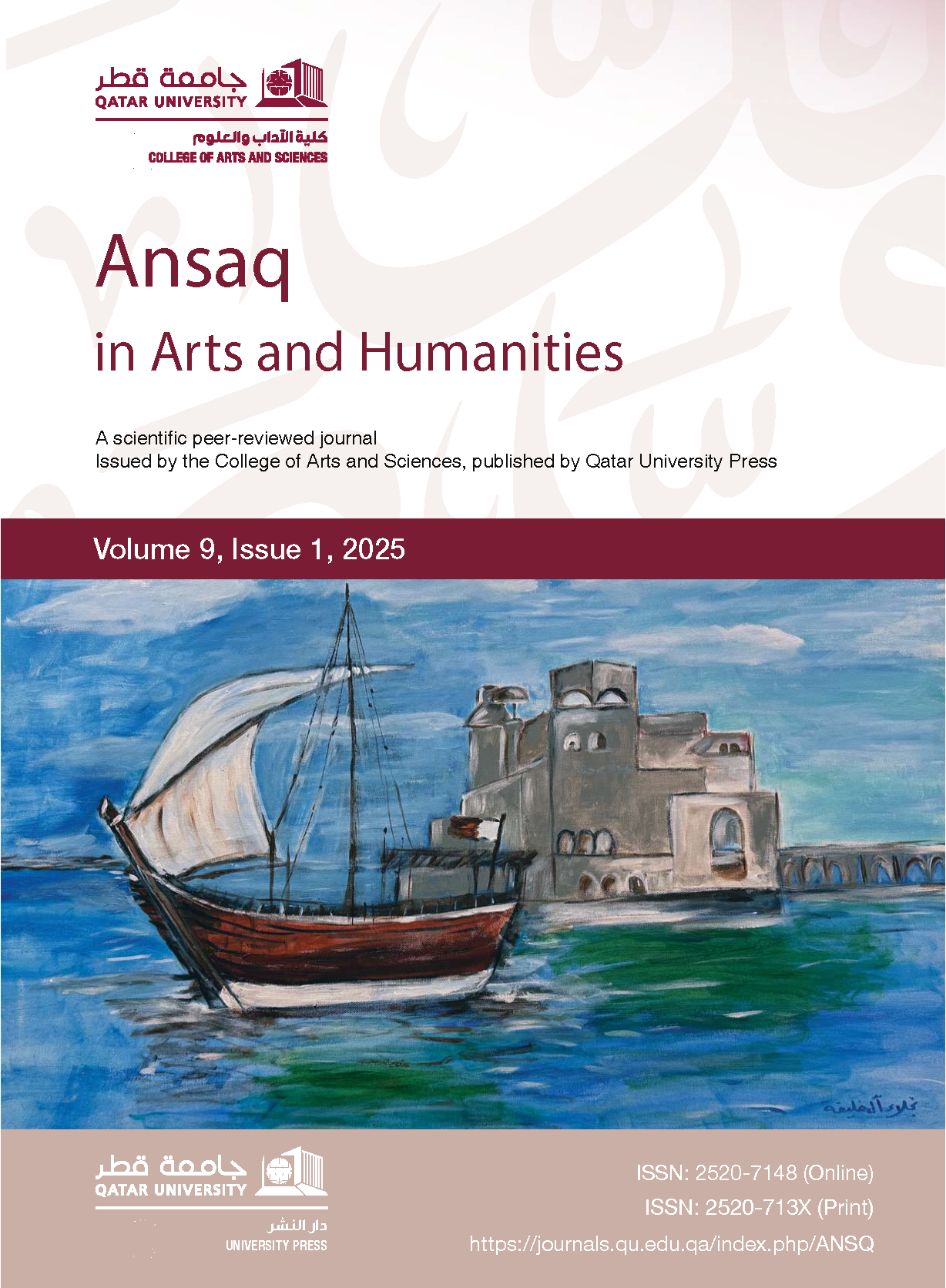Imam al-Farahi's Pragmatics Study of the Language of the Qur'an–Analytical approach
Abstract
This research aims to show aspects of the relationship between the interpretive heritage and the modern Pragmatics approach by highlighting the features of the deliberative approach to the language of the Holy Qur'an by Abdul Hamid al-Farahi, based on his heritage in interpretation and Qur'anic sciences, where he celebrated the importance of recognizing the relationship between the language of the Qur'an and the ancient Arabic use of language. The research focused on the importance of recognizing the relationship between the language of the Qur'an and the ancient Arabic use of language, and the impact of the linguistic, linguistic and Pragmatics data during the revelation of the Qur'an on the meanings of its vocabulary, methods and ways of organizing and expressing, and the need to take into account the specificity of the language of the Qur'an as a message of revelation, and the conditions of those who addressed it, the first recipients of its message, and its addressee.
The research adopted the analytical approach in extracting Al-Farahi's efforts in employing the concepts of the Pragmatics approach in the study of the language of the Qur'an, overcoming the issues that some interpreters and orientalists fell into, and monitoring their impact in opening horizons for optimal reflection on the Holy Qur'an.
The research reached some of the most important results: Al-Farahi's studies and researches in the study of the language of the Holy Quran at the level of vocabulary, methods, systems and context will undoubtedly realize the richness of his studies and the use of the concepts of Pragmatics analysis in the study of Quranic stylistic phenomena, which confirms that scholars of interpretation were earlier to apply the contents of many Pragmatics linguistic theories, even if they did not call them modern terms.
The research concludes that the heritage of Imam Abdul Hamid al-Farahi in tafsir and Qur'anic sciences in general and in the linguistic study of the Holy Qur'an in particular is rich in what enriches the contemporary Qur'anic study, although it has not yet received the study, scrutiny and follow-up it deserves.
Metrics
##plugins.themes.bootstrap3.article.details##
PragmaticsInterpretationQur'anic methodsEllipsisal-Farahi
al-Farāhī, ʻAbd al-Ḥamīd. "al-Takmīl fī Uṣūl al-Taʼwīl" (in Arabic), In Rasāʼil al-Imām al-Farāhī fī ʻUlūm al-Qurʼān al-Majmūʻah al-Ūlá. 2nd ed., al-dāʼirah al-Ḥamīdiyyah, India, 1991.
–––. "Asālīb al-Qurʼān" (in Arabic), In Rasāʼil al-Imām al-Farāhī fī ʻUlūm al-Qurʼān al-Majmūʻah al-Ūlá. 2nd ed., al-dāʼirah al-Ḥamīdiyyah, India, 1991.
–––. Jamharat al-Balāghah (in Arabic), Dirāsah wa-Taḥqīq: Muḥammad Khālid al-Ruhāwī wa-ʻĀmir Khalīl al-Jarrāḥ. 1st ed., Dār Sanābil, Istanbul, 2019. (in Arabic).
–––. Mufradāt al-Qurʼān (in Arabic), Taḥqīq wa-Sharḥ: Muḥammad Ajmal Ayyūb al-Iṣlāḥī. 2nd ed., al-dāʼirah al-Ḥamīdiyyah, India, 2004.
–––. Niẓām al-Qurʼān wa-Taʼwīl al-Furqān bi-al-Furqān (in Arabic), Iʻtanā bihi: ʻUbayd Allāh al-Farāhī. 1st ed., Dār al-Gharb al-Islāmī, Tunisia, 2012.
–––. Taʻlīqāt fī Tafsīr al-Qurʼān al-Karīm (in Arabic), Prep. al-Duktūr ʻUbayd Allāh al-Farāhī, Rev. al-Shaykh Muḥammad Amānat Allāh al-Iṣlāḥī. 1st ed., al-dāʼirah al-Ḥamīdiyyah, India, 2010.
al-Raḥmūnī, Bū minqāsh. "al-ḍawābiṭ al-Tadāwulīyah lil-naṣṣ al-dīnī : al-tafsīr unamūdhajan" (in Arabic), ḍimna aʻmāl Nadwat al-waḥy wa-al-muqārabāt al-ḥadāthīyah: bayna taṭwīr al-fahm wāstyʻāb al-maʻná, Muʼassasat Muʼminūn bi-lā ḥudūd lil-Dirāsāt wa-al-Abḥāth, 2013. Available at https://www.mominoun.com/pdf1/2014-12/549abf8922781712693607.pdf
Al-Zajjāj, Ibrāhīm ibn al-Sarī ibn Sahl. Maʻānī al-Qurʼān wa-Iʻrābuhu (in Arabic), Ed. ʻAbd al-Jalīl ʻAbduh Shalbī. 1st ed., ʻĀlam al-Kutub, Beirut, 1988.
Austin, J. L. How to Do Things with Word. 2nd ed., Harvard University Massachusetts, 1975.
Cuypers, M. A Qur'anic Apocalypse: A Reading of the Thirty-Three Last Surahs of the Qur'an. (International Qur'anic Studies Association Studies in the Qur'an), Lockwood Press, 2018.
Farrin, R. Structure and Quranic Interpretation: A Study of Symmetry and Coherence in Islam's Holy text (Islamic Encounter Series), White Cloud Press, 2014.
Naḥlah, Maḥmūd Aḥmad. Āfāq Jadīdah fī al-Baḥth al-Lughawī al-Muʻāṣir (in Arabic), Dār al-Maʻrifah al-Jāmiʻiyyah, Alexandria, 2002.
Ṣaḥrāwī, Masʻūd. Al-Tadāwuliyyah ʻinda al-ʻUlamāʼ al-ʻArab (in Arabic), Dār al-Tanwīr, Algeria, 2020.
Ṣawlah, ʻAbd Allāh. al-Ḥijāj fī al-Qurʼān min Khilāl Aham Khaṣāʼiṣihi al-Uslūbiyyah (in Arabic), 2nd ed., Dār al-Fārābī, Beirut, 2007.
Searle, J. R. Speech Acts, An Essay in the Philosophy of Language. 31st ed., Cambridge University Press, 2009.
*************************************************************************************************
الرحموني، بو منقاش. «الضوابط التداولية للنص الديني: التفسير أنموذجًا». ضمن أعمال ندوة الوحي والمقاربات الحداثية: بين تطوير الفهم واستيعاب المعنى، مؤسسة مؤمنون بلا حدود للدراسات والأبحاث، 2013. على الرابط: https://www.mominoun.com/pdf1/2014-12/549abf8922781712693607.pdf
الزجاج، أبو إسحاق إبراهيم بن السري بن سهل. معاني القرآن وإعرابه. تحقيق، عبد الجليل عبده شلبي. ط1، عالم الكتب، بيروت، 1988.
صحراوي، مسعود. التداولية عند العلماء العرب. دار التنوير، الجزائر، 2020.
صولة، عبد الله. الحجاج في القرآن من خلال أهم خصائصه الأسلوبية. ط2، دار الفارابي، بيروت، 2007.
عبد الرحمن، طه. تجديد المنهج في تقويم التراث. ط2، المركز الثقافي العربي، الدار البيضاء–بيروت.
الفراهي، عبد الحميد. «أساليب القرآن». ضمن رسائل الإمام الفراهي في علوم القرآن - المجموعة الأولى. ط2، الدائرة الحميدية، الهند، 1991.
–––. «التكميل في أصول التأويل». ضمن رسائل الإمام الفراهي في علوم القرآن – المجموعة الأولى. ط2، الدائرة الحميدية، الهند، 1991.
–––. تعليقات في تفسير القرآن الكريم. إعداد عبيد الله الفراهي، مراجعة الشيخ محمد أمانة الله الإصلاحي. ط1، الدائرة الحميدية، الهند، 2010.
–––. جمهرة البلاغة. دراسة وتحقيق: محمد خالد الرهاوي، وعامر خليل الجراح. ط1، دار سنابل، إسطنبول، 2019.
–––. مفردات القرآن، تحقيق وشرح محمد أجمل أيوب الإصلاحي. ط2، الدائرة الحميدية، الهند، 2004.
–––. نظام القرآن وتأويل الفرقان بالفرقان، اعتنى به عبيد الله الفراهي. ط1، دار الغرب الإسلامي، تونس، 2012.
نحلة، محمود أحمد. آفاق جديدة في البحث اللغوي المعاصر. دار المعرفة الجامعية، الإسكندرية، 2002.


